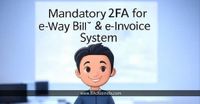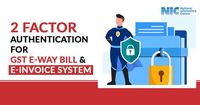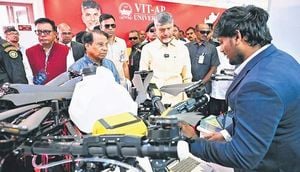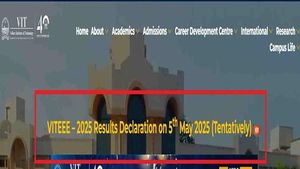The National Informatics Centre (NIC) has announced the implementation of Two-Factor Authentication (2FA) for taxpayers and transporters who access the e-Way Bill and e-Invoice systems. This crucial enhancement aims to bolster access control and improve cybersecurity within India’s digital taxation ecosystem.
Starting immediately, the new authentication process will require users to verify their identity through a one-time password (OTP) in addition to their regular login credentials. The OTP can be obtained through three distinct methods: via SMS sent to the registered mobile number, through the government-backed Sandes messaging app, or by using the NIC-GST-Shield app, which generates offline OTPs that refresh every 30 seconds.
To activate this 2FA system, users must log into the e-Way Bill System, navigate to the 2-Factor Authentication option, and confirm their registration. Once activated, OTP authentication will be mandatory for all logins, including those of sub-users operating under a single Goods and Services Tax Identification Number (GSTIN).
The introduction of 2FA is a significant step in enhancing security, especially for businesses that manage multiple sub-users. The primary user has the ability to create and manage sub-user accounts, assigning specific permissions for e-way bill operations such as generating, canceling, or overseeing waybills. This system also enables real-time monitoring of sub-user activities, which is expected to enhance transparency and accountability in business operations.
According to the NIC, users have three options for generating and receiving OTPs. The SMS-based OTP will be sent directly to the user's registered mobile number, while the Sandes app provides a secure platform for OTP reception. The NIC-GST-Shield app, a dedicated mobile application available for download through the e-Way Bill and e-Invoice portals, allows users to generate OTPs without needing an internet connection, ensuring uninterrupted authentication.
As cybersecurity threats and data breaches become increasingly prevalent, the NIC's introduction of 2FA is anticipated to enhance security measures and significantly reduce unauthorized access to the e-Way Bill and e-Invoice systems. This initiative aligns with broader digital transformation efforts aimed at securing India’s tax infrastructure and ensuring compliance with regulatory mandates.
Industry experts have voiced strong support for this move, noting that it will greatly mitigate risks associated with password breaches and cyber fraud, particularly in a landscape where digital transactions are on the rise. The NIC’s proactive approach underscores the government’s commitment to fortifying digital taxation processes and safeguarding sensitive financial data.
As businesses and transporters adapt to this new authentication process, the NIC has committed to continuously monitoring user feedback and refining the system to enhance user experience while maintaining robust security protocols. This ongoing commitment to improvement reflects the NIC’s understanding of the dynamic nature of cybersecurity threats and the importance of user trust in digital systems.
For those unfamiliar with the registration process, the NIC has provided clear instructions. Users need to log into the e-Way Bill System, navigate to the Main Menu, select the 2-Factor Authentication option, and confirm their registration. After completing this step, users will be prompted for an OTP along with their username and password each time they log in.
Moreover, the OTP authentication is tailored to individual user accounts. Sub-users under a GSTIN will have separate authentication requirements based on their registered mobile numbers in the e-Way Bill and e-Invoice systems. Once registered for 2FA, this requirement extends to both the e-Way Bill and e-Invoice systems.
Main users are also granted the capability to create sub-users, with the flexibility to assign permissions for generating or canceling e-way bills, or granting all options to these sub-users. Furthermore, main users can monitor the activities of their sub-users regularly, ensuring that operations remain secure and efficient.
The introduction of 2FA for the e-Way Bill and e-Invoice systems represents a pivotal move towards enhancing the security framework of India's digital tax infrastructure. As the country continues to embrace digital transformation, initiatives like this are vital in protecting sensitive information and maintaining the integrity of financial transactions.
In summary, the implementation of Two-Factor Authentication by the NIC marks a significant advancement in the security of the e-Way Bill and e-Invoice systems. By requiring an additional layer of verification, the NIC aims to protect users from potential cyber threats and ensure a more secure environment for digital transactions.





